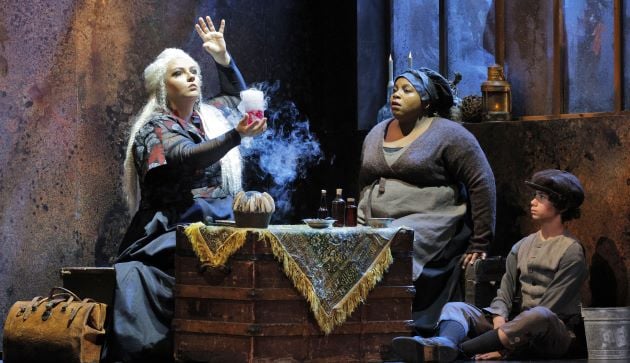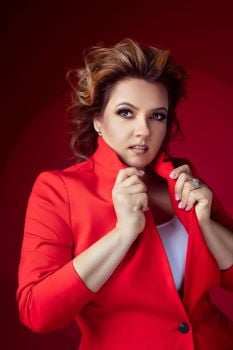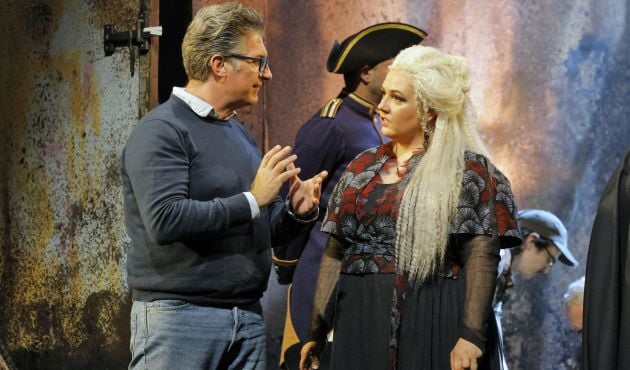
There are debuts and then there are triple debuts. When the Romanian-Hungarian mezzo-soprano Judit Kutasi, delivered a knock-out performance as Ortrud in Lohengrin last October in her San Francisco Opera debut, it was also the singer’s first U.S. appearance, as well as her role debut, which the San Francisco Chronicle’s Joshua Kosman described as “ferocious and unstoppable.”
Bay Area audiences will have another chance to see Kutasi when she returns to the War Memorial Opera House to open SF Opera’s season on Sept. 6. Singing the role of Ulrica in Verdi’s Un ballo in maschera for seven performances, Kutasi will also take part in the free Opera in the Park concert Sept. 8.
Born in Timișoara, Romania, Kutasi studied voice, piano, and cello at the Colegiul National de Artă “Ion Vidu,” and continued her studies at the University of Oradea and the Music Academy Gheorghe Dima in Cluj-Napoca, graduating with a master’s degree. In the 2013–2014 season, the singer was part of the International Opera Studio of the Zurich Opera and then became a permanent ensemble member there until 2016. Since then, she has been a frequent guest artist at the Deutsche Oper Berlin.
Earlier this year, the mezzo celebrated her Metropolitan Opera debut as Preziosilla in Mariusz Trelinski’s new production of La forza del destino This year she also performed the role of Amneris (in Aida) with the Hungarian State Opera in Budapest, and she will reprise the role at the Met as part of the organization’s 2024–25 season.
Last year, Kutasi made her house debut at the Royal Danish Opera in Copenhagen with Giuseppe Verdi’s Requiem Mass, and also appeared for the first time with the Salzburg Easter Festival performing the same masterwork under the baton of Antonio Pappano.
SFCV caught up with the Germany-based, fiendishly busy singer by Zoom, where the conversation ranged from her U.S. debut and the appeal of Verdi to her practice regimen.

Was there music in your family, and when did you know you wanted to be an opera singer?
My grandmother from my father’s side was an actress [and] also singing small operettas. She played in small theater pieces in my hometown on the amateur level. My great grandfather was playing [a stringed] instrument at weddings, and he was singing, too. My mother realized that I am very musical and am dancing very well; I have good rhythm, [and] was always listening to music, and when I saw classical music on TV, I would stop and run to the TV.
I started studying piano and cello and was in love with both instruments. But I couldn’t be a pianist, because I started late at 10, even though I was playing in church all the time. When I realized I wanted to be an opera singer, my cello teacher brought that up to me. She would always make me learn every concerto by heart, to sing it by voice and then play it on cello.
She noticed I had something special in my voice [and asked], “Do you know what opera is? Do you know what’s an opera singer?” Of course, when I was so young I saw it only on TV and said, “No, I never met an opera singer. I don’t know what that entails.” Then [she] said, “Okay, would you like to explore this?” I thought, “Why not, I was singing since I was four years old in church,” so [at] 12, I was starting serious teaching lessons with a soprano who passed away in my hometown.
What was it like making your American debut in SF Opera’s Lohengrin, and then making your Met debut this past February in La forza del destino?
Oh my, it was a crazy ride! My mother always says to me that if I go in doing something, I will do it 150 percent. I would call her and tell her, “How am I going to make it — a triple debut?” It was emotional [and] it was amazing. There’s such an amazing team and family at San Francisco Opera.
The support was just heartfelt, [that] if I need anything, they will be there to help and catch me, and just be there for me. It’s not easy to have a triple debut, and on top of that, it’s a huge Wagner opera, a huge role sung by most of the amazing opera singers before me. I stepped [into] big shoes.
At the Met, that was a whirlwind. I just finished my last performance of [Laura in Amilcare Ponchielli’s] La Gioconda in Berlin the night before, [and] the next day I flew to New York. And the next day, I was onstage, singing. It was amazing; it was such a beautiful production, as well.
I loved the costume, the concept of how they came up with Preziosilla, [because she’s] always a character that doesn’t have anything to do with the opera. If you think of it, she’s not relatable to any of the other characters. How they put her in the spotlight was amazing. It was a good time, but a crazy time. It was a good success, as well.
You’re returning to SF Opera for Ulrica in Verdi’s Un ballo in maschera. Have you worked with the director, Leo Muscato, before? How do you prepare for a role? And what are your thoughts on working with Music Director Eun Sun Kim again?
I haven’t worked with Leo, but we have crossed paths in Italy, and we knew of each other. He knows my work, and I’m very happy I get the chance to work with him [here]. I was sitting the other day in the audience, and I think this production will be amazing. I love it, and I hope the audience will love it, too.
How to prepare? I always make sure that even if I sang the role many, many times, every time when I take the score in my hand, I find new things. I try new things. It’s a great inspiration, as well, to work with maestra Eun Sun Kim. I love to work with her. She will bring attention [to] small details that make up the whole aria or the whole scene. Of course, when you sing a role so many times, you just pass by it, you don’t think of it in so much detail — musically-wise. She brings those details that make the whole piece much more different.
Having sung so many Verdi roles, what do you appreciate most about the composer?
I love everything! When I sing all of the mezzo roles of Verdi, the music, the emotions, how he wrote for a mezzo-soprano — it’s just up there for me. For example, in Aida, the music he wrote for Amneris, and how he built up her character, she can steal the show.
I think, for me and for my voice, Verdi feels like home. I always dreamed of singing Verdi, and when I started, it just felt good. It speaks to my voice, it speaks to my soul, the whole package. Every time I find new things working with different conductors, stage directors, different conceptions, it just brings a different view and a different perspective.
l feel like now, with Ballo — I’ve sung it many, many times, and [in] many productions, and I was looking forward to see what I can bring new to the table. Come and see it, and you will see the inspiration I get from the whole team, and especially [from] Eun Sun Kim. I’m really enjoying it.
What is your practice regimen like?
I always try to practice [by] myself and get my own time before I go to any coach, or even when I’m working with conductors, because I like to have some good relationships with different conductors, to be able to work with them on different kinds of roles. But first I do my own work in my kitchen. I do record myself a lot, to be able to see what I like and what I don’t like. I’m the biggest critic of myself.
Then I go to a coach, because I need an external ear. We can’t hear ourselves when we sing, [there’s] only an inner ear sound. It’s always good to have somebody outside [to say], “This sounds good; this doesn’t sound good. What can we do to make it better?” So, first in my kitchen, then a coach, then with the maestra to control my sound.

Excuse me, Judit, but just to be clear, when you say kitchen, does this mean you’ve got a piano in your kitchen, that the acoustics are better there, or what?
I say the kitchen, because I don’t sing in the kitchen, but what I meant is, I do my work there, [like] when you start cooking: You cut the potatoes, you cut the onions, that little work [that] I like to do myself. Then I like to go out to a coach or a conductor. It’s the first work a singer does. I call it my kitchen prep.
Thanks for setting me straight on that! I’m wondering who have some of your inspirations been?
My inspirations? The greatest opera singers, all over the world. My greatest inspiration from when I started to study opera singing, it was of course my Romanian teacher, Elena Cernei. She was a well-known mezzo. Also, Elena Obraztsova, Jessye Norman, Grace Bumbry, just name it. And I’m listening to other kinds of music: I love [Jacqueline] du Pré. When she’s playing cello concertos, I feel like the mezzo voice is a cello instrument. The sound is the same. That inspires me a lot, as well.
What advice do you have for aspiring opera singers?
For new opera singers I would say, work, work, and more work; study, study, and more study. It is very important to study and know yourself, to be connected to your individual body and spirit. To know what you want, to have a goal that you want to go toward to accomplish something. Networking — it’s very important — competitions, master classes, opera studios, auditions. Get to know how to be out there. But first, you have to do your own kitchen prep!
Minus the potatoes and onions, of course! Judit, where do you see yourself in the next five to ten years?
Singing everywhere!

